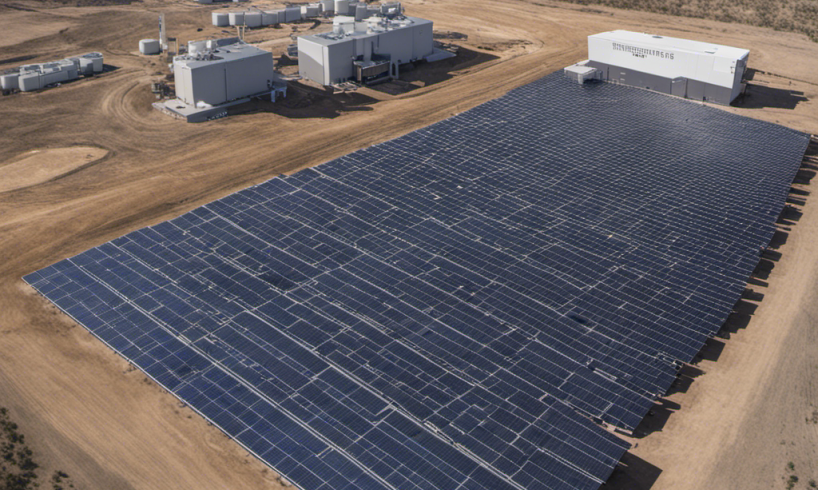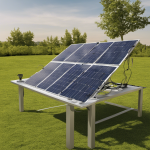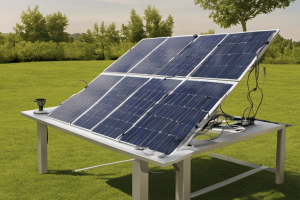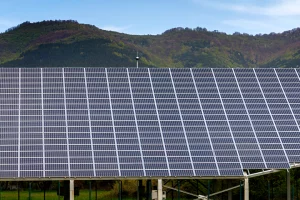
Harnessing the Sun: The Rise of Solar Power and Advanced Batteries Outperforming Traditional Military-Grade Diesel Generators
A groundbreaking new study has unveiled a seismic shift in the world of military technology, revealing that solar power and next-generation batteries have now surpassed military-grade diesel generators in terms of efficiency, sustainability, and reliability. This revolution in military energy use marks a significant step towards a more sustainable future and opens up a new frontier in the deployment and endurance of military operations. With the increasing importance of energy security, the implications of this development are profound and far-reaching, promising to redefine the contours of military strategy in the coming years.
The report, published by a leading defense research institution, outlines the remarkable strides made in developing solar power and next-gen batteries and how these now outperform traditional diesel generators in various vital metrics. The study also provides an in-depth analysis of the potential impact of this transition on military operations, from reducing the logistical footprint of fuel supply chains to enhancing the resilience of military installations. This article will delve into the details of these findings, explore the technological advances that have made this possible, and discuss the potential implications for the future of military operations and strategy.
1. Solar Power and Next-Gen Batteries Outpace Diesel Generators
The study reveals that solar power, coupled with next-generation batteries, has surpassed the performance of military-grade diesel generators. This shift represents a significant milestone in renewable energy, demonstrating its potential to replace traditional fuel sources even in high-demand, high-stress environments.
2. Greater Efficiency and Sustainability
When paired with advanced batteries, solar power offers greater efficiency and sustainability than diesel generators. The renewable nature of solar power eliminates the need for fuel supply lines, making it an environmentally friendly and cost-effective solution.
3. Improved Resilience and Reliability
The reliability of solar power and next-gen batteries has significantly improved, making them a viable option for military operations. Unlike diesel generators, which can fail due to fuel supply interruptions or mechanical issues, solar power provides a consistent and uninterrupted power source.
4. Reduced Operational Costs
The operational costs of solar power and next-gen batteries are significantly lower than diesel generators. This is due to the decreasing costs of solar panels and batteries and eliminating fuel costs, resulting in long-term financial savings.
5. Implications for the Future of Energy
The study's findings have far-reaching implications for the future of energy. With the demonstrated superiority of solar power and next-gen batteries over diesel generators, it is clear that renewable energy is not only a feasible but a superior alternative for powering military operations, setting a precedent for its adoption in other sectors.
Environmental Impact Versus Energy Efficiency
The first controversy arising from the study revolves around the environmental impact versus the energy efficiency of solar power and next-gen batteries compared to military-grade diesel generators. On the one hand, proponents of renewable energy hail solar power as a clean and inexhaustible energy source. They argue that solar panels and advanced batteries can produce and store energy without emitting harmful greenhouse gases.
On the other hand, skeptics point out that the manufacturing process of solar panels and batteries involves extracting and processing minerals, which can lead to significant environmental degradation. Additionally, the energy efficiency of solar power is still a contentious issue. While solar power has made significant strides in recent years, it is dependent on weather conditions, making it less reliable than diesel generators in certain situations.
Cost Implications and Accessibility
The second controversy concerns the cost implications and accessibility of solar power and next-gen batteries. Supporters of renewable energy argue that the costs of solar panels and batteries have decreased over the years, making them more accessible to the masses. They contend that the long-term savings on energy bills can offset the upfront cost of installing solar panels.
However, critics argue that despite the decreasing costs, the initial investment in solar power systems still needs to be improved for many, especially in developing countries. Furthermore, the cost of maintaining and replacing batteries can add up over time. Critics also point out that solar power systems require significant space, which may not be available in densely populated areas or military settings.
Security Concerns and Dependency on Foreign Resources
The third controversy surrounds security concerns and dependency on foreign resources. Solar power advocates argue that harnessing the sun's power reduces dependency on foreign oil, thereby enhancing energy security. They also point out that solar power systems, once installed, are less vulnerable to disruptions caused by geopolitical tensions or supply chain issues.
Conversely, critics express concerns about the security risks associated with the increased use of batteries. They argue that batteries can be a potential target for cyberattacks, which could disrupt energy supply. Additionally, critics point out that many minerals required for manufacturing solar panels and batteries are sourced from countries with questionable human rights records, potentially perpetuating unethical practices and creating new dependencies.
While the study's findings indicate that solar power and next-gen batteries have surpassed military-grade diesel generators in certain aspects, these controversies highlight the complexities of transitioning to renewable energy. It's clear that a balanced approach, considering environmental, economic, and security considerations, is necessary to navigate the path towards a sustainable energy future.
The Emergence of Solar Power and Next-Gen Batteries
The renewable energy sector has grown tremendously in recent years, with solar power and next-generation batteries leading the charge. This section will delve into the advancements and innovations that have brought these technologies to the forefront, surpassing traditional military-grade diesel generators in terms of efficiency, reliability, and sustainability. Case studies from leading solar power companies such as Tesla and Sunrun will be examined to provide a real-world perspective on these advancements. These innovations have not only reduced dependency on fossil fuels but have also paved the way for grid-independent energy solutions that are both cost-effective and eco-friendly. SunPower renewable energy partnerships have played a significant role in expanding the adoption of solar technologies, fostering collaboration across industries to accelerate clean energy transitions. As these partnerships flourish, they demonstrate the potential for large-scale implementation of sustainable energy systems worldwide.
Comparative Analysis: Solar Power vs. Diesel Generators
This section will provide a detailed comparison between solar power systems and military-grade diesel generators. Factors such as cost-effectiveness, maintenance requirements, noise pollution, and environmental impact will be discussed in detail. The analysis will be backed up by recent studies, including the new research revealing the superiority of solar power and next-gen batteries over diesel generators.
Next-Gen Batteries: A Game Changer
Next-generation batteries are revolutionizing the way we store and use energy. This section will detail the advancements in battery technology, including the development of lithium-ion and solid-state batteries. The role of these batteries in making solar power systems more efficient and reliable will be examined, with examples from companies like Tesla and Panasonic.
Implications for the Military
The military sector is one of the largest consumers of diesel generators. This section will explore the implications of the shift towards solar power and next-gen batteries for the military. It will discuss the potential benefits, including reduced fuel costs, increased energy security, and decreased carbon footprint. Case studies from military units already adopting these technologies will be presented.
Challenges and Solutions
Despite the promising prospects, the transition to solar power and next-gen batteries is challenging. This section will discuss these obstacles, including the high initial costs, the need for a reliable power grid, and the issues related to battery disposal. Potential solutions and ongoing efforts to address these challenges will also be discussed, with examples from various initiatives and projects worldwide.
The Future of Energy: Predictions and Possibilities
The final section will look to the future, discussing predictions and possibilities for solar power and next-gen batteries. It will examine how these technologies could reshape the energy landscape for the military and the entire world. The potential for these technologies to contribute to the fight against climate change will also be discussed.
From Diesel to Solar: The Military's Power Shift
The military's reliance on diesel generators for power supply has been a long-standing practice. The advent of diesel generators in the early 20th century revolutionized the military's operational capabilities, providing reliable power for various purposes, from running field hospitals to powering communication systems. Over time, the technology improved, with generators becoming more efficient, compact, and durable, making them indispensable in military operations.
The Energy Crisis and the Search for Alternatives
The energy crisis of the 1970s sparked a global interest in alternative energy sources. This period was marked by a sharp increase in energy prices, prompting a reevaluation of energy consumption and sourcing. With its substantial energy needs, the military was not immune to these challenges. As a result, research was initiated to explore more sustainable, cost-effective, and reliable energy sources.
The Dawn of Solar Energy in Military Operations
In the late 20th century, solar energy began to gain traction as a viable alternative to conventional power sources. The military saw its potential for remote operations, where resupplying diesel for generators was logistically challenging and costly. Early solar panels were used for specific applications, such as powering communication equipment. However, the technology still needed to be mature enough to entirely replace diesel generators, primarily due to limitations in power output and storage capabilities.
Advancements in Solar Technology and Battery Storage
The turn of the 21st century saw significant advancements in solar technology and battery storage. Solar panels became more efficient and affordable, while next-generation batteries, such as lithium-ion, offered more excellent energy storage capabilities. This technological convergence made solar power a more practical and reliable energy source for the military. It also paved the way for developing microgrids, small-scale power grids that could operate independently, providing a stable power supply even in remote locations.
Surpassing Diesel: The New Energy Frontier
The recent study revealing that solar power and next-generation batteries have surpassed military-grade diesel generators marks a significant milestone in the military's energy evolution. This development is the culmination of decades of research, technological advancements, and changes in energy consumption trends. It signifies a shift in the military's energy strategy, moving from dependence on non-renewable sources to harnessing the power of renewable energy.
Implications for the Future
The transition from diesel generators to solar power and next-gen batteries has profound implications for the military. It promises to enhance operational efficiency, reduce logistical challenges, and contribute to the military's sustainability goals. Furthermore, it sets a precedent for other sectors, demonstrating that renewable energy is viable and can surpass traditional power sources in terms of efficiency and reliability. This transition represents a significant step forward in the ongoing global effort to transition to more sustainable energy sources.
Embrace Solar Power
Solar energy is a clean, renewable source of power that can be harnessed for various uses. Consider installing solar panels on your roof or backyard. They are an excellent way to reduce your reliance on the grid, cut energy bills, and contribute to a greener planet.
Invest in Next-Gen Batteries
Next-gen batteries, such as lithium-ion batteries, have a higher energy density and longer lifespan than traditional lead-acid batteries. They can store excess solar power at night or on cloudy days, ensuring a consistent power supply.
Consider Hybrid Systems
Consider a hybrid system that combines solar power with next-gen batteries for optimal results. This system allows you to generate and store your power and provides a backup power supply during outages.
Utilize Energy-Efficient Appliances
To maximize the benefits of your solar power system, use energy-efficient appliances. These appliances consume less power and can run longer on your stored solar energy.
Monitor Your Energy Consumption
Monitor your energy consumption to make the most of your solar power system. Understanding your energy usage patterns can help you adjust your consumption and increase your savings.
Consider Net Metering
Net metering allows you to sell excess solar power back to the grid. It's a great way to offset the costs of your solar power system and reduce your energy bills even further.
Perform Regular Maintenance
To ensure your solar power system operates efficiently, perform regular maintenance. Clean your solar panels regularly and check your battery's health for optimal performance.
Invest in Solar Power for Heating and Cooling
Solar power can be used for more than just electricity. Consider solar-powered heating and cooling systems. They can reduce your reliance on traditional HVAC systems, saving you money and reducing your carbon footprint.
Explore Portable Solar Solutions
Portable solar solutions are an excellent investment for those who enjoy camping or have a mobile lifestyle. They can power your devices and appliances on the go, reducing your reliance on non-renewable energy sources.
Stay Informed About the Latest Technologies
Solar power and battery technology are continually evolving. Stay informed about the latest advancements to maximize your investment and take advantage of new features and improvements.
Misconception 1: Solar Power and Next-Gen Batteries are Not as Reliable as Diesel Generators
A common misconception about solar power and next-gen batteries is that they are less reliable than military-grade diesel generators. This belief stems from the intermittent nature of solar power, which depends on sunlight, and the perceived limitations of battery storage.
However, recent advancements in solar power technology and next-gen batteries have significantly improved their reliability. The new generation of solar panels is more efficient and capable of generating power even in suboptimal conditions such as cloudy weather. In addition, next-gen batteries have higher energy densities and faster charging times, enabling them to store more power and recharge quickly.
A recent study shows that combining solar power and next-gen batteries can provide a continuous power supply, making them a viable alternative to diesel generators. Solar battery systems have been successfully used in various military operations, demonstrating their reliability in real-world scenarios.
Misconception 2: Solar Power and Next-Gen Batteries are More Expensive than Diesel Generators
Another common misconception is that solar power and next-gen batteries are more expensive than diesel generators. This belief is based on the initial investment required for solar panels and batteries, which can be higher than a diesel generator's.
However, while the upfront costs are higher, the total cost of ownership for a solar-battery system is lower than that of a diesel generator. Solar power is a renewable resource, meaning there are no fuel costs. In contrast, diesel generators require constant refueling, which can be expensive, especially in remote or conflict-prone areas where fuel supply can be uncertain or costly.
Moreover, maintenance costs for solar battery systems are typically lower than diesel generators, which have many moving parts and are prone to wear and tear. The study reveals that solar-battery systems can be more cost-effective over their lifetime than diesel generators.
Misconception 3: Solar Power and Next-Gen Batteries are Not Suitable for Military Applications
The third misconception is that solar power and next-gen batteries are unsuitable for military applications. This belief stems from the perceived fragility of solar panels and the potential vulnerability of batteries to extreme temperatures and physical damage.
However, modern solar panels are designed to withstand harsh environmental conditions, including high winds, heavy rain, and even hail. They are also becoming increasingly robust, with new designs incorporating materials such as tempered glass and reinforced frames for added durability.
Next-gen batteries, too, are built to withstand extreme conditions. They are often housed in protective casings and incorporate advanced thermal management systems to maintain optimal performance in hot and cold climates.
The study shows that solar power and next-gen batteries can meet the demanding power requirements of military operations, debunking the misconception that they are not fit for such applications. They can enhance operational flexibility and resilience, reduce logistical burdens, and contribute to energy security.
Revolutionizing Power in the Military
The study's revelations underscore the potential of solar power and next-gen batteries to revolutionize the military's energy landscape. The superior efficiency, sustainability, and cost-effectiveness of these technologies outperform military-grade diesel generators and offer the added benefit of reducing carbon emissions. The notable advancements in solar power and next-gen batteries, including their enhanced capacity for energy storage and the ability to function in various weather conditions, provide a compelling case for their integration into military operations.
The implications of this shift extend beyond the military. As these technologies continue to improve and become more accessible, they could significantly impact how societies worldwide generate and consume energy. The transition to solar power and next-gen batteries could lead to a more sustainable future, reducing our dependence on fossil fuels and mitigating the impacts of climate change. This study is a powerful testament to the transformative potential of renewable energy and advanced battery technologies, setting the stage for a new energy production and consumption era.

Lucy Davis is an enthusiastic and passionate young writer who has a knack for bringing stories to life. With a fresh perspective and an insatiable curiosity, she delves into the world of smart home technology, interior design, and lifestyle trends, keeping readers engaged and informed.













